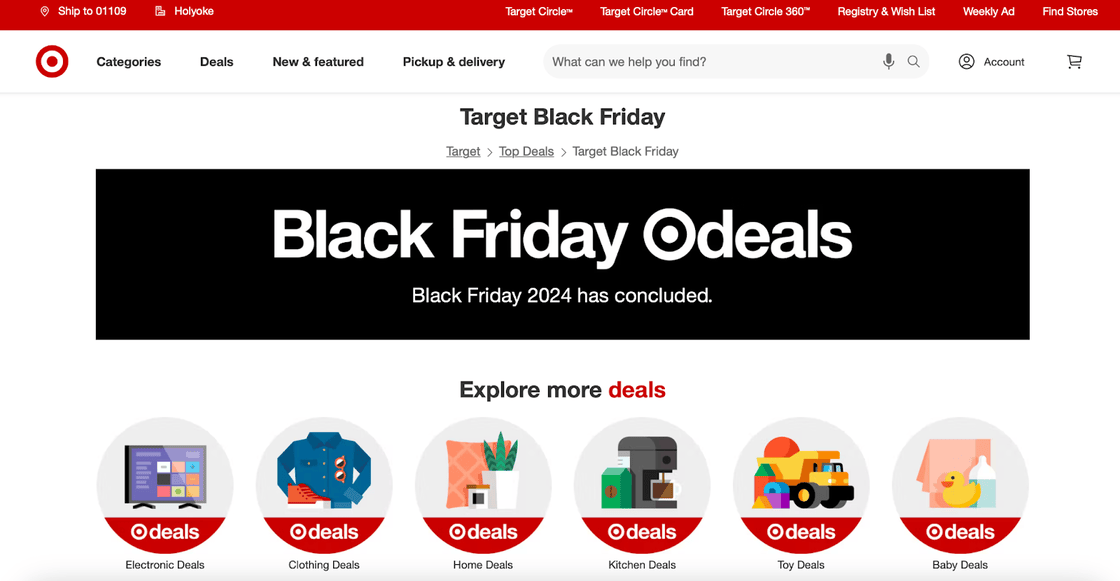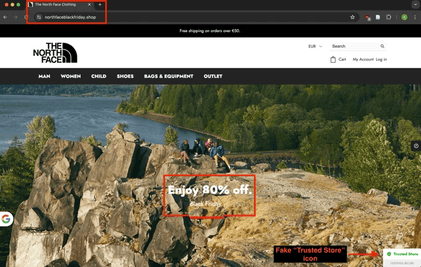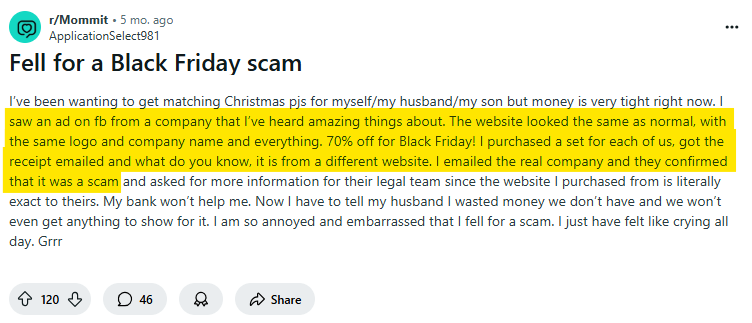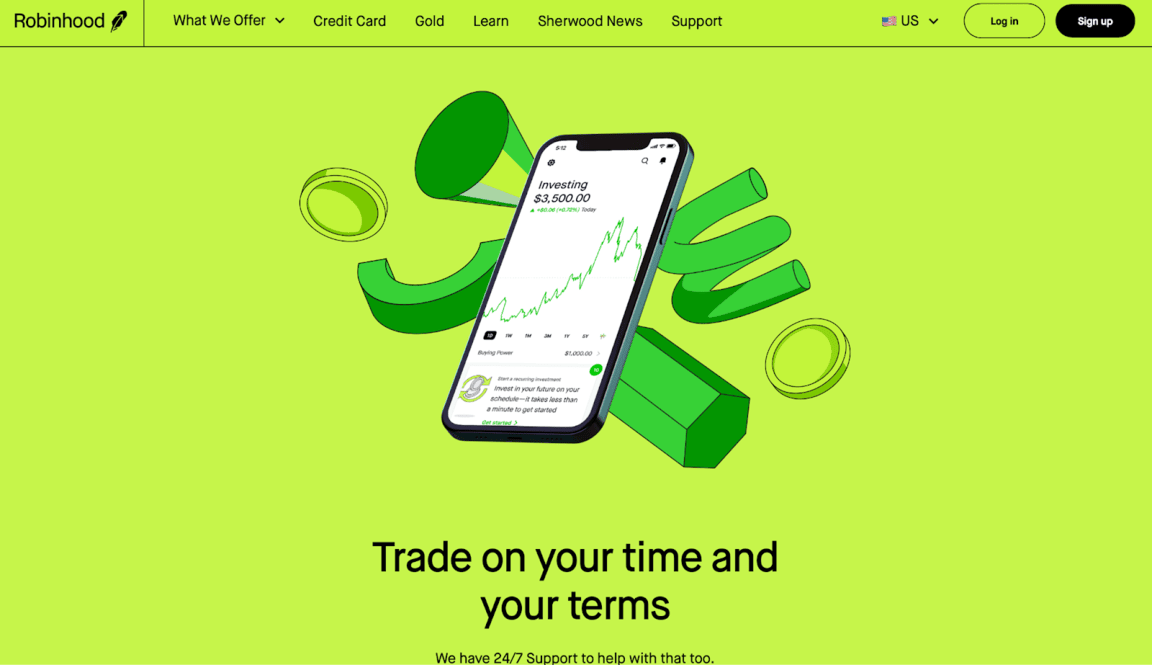Is Black Friday a Scam?
Laura Martisiute
Reading time: 5 minutes

Table of Contents
If you’re thinking of taking advantage of Black Friday, you need to know: Is Black Friday a scam?
Below, we explain whether Black Friday is a scam and discuss some steps you can take to improve your safety when shopping on this day.
What Is Black Friday?
Black Friday is a day when many shops hold sales with big discounts. It takes place every Friday after Thanksgiving in the US.

The day often marks the start of the Christmas shopping season.
Some shops don’t just offer discounts on Friday but hold sales until Monday, known as “Cyber Monday,” or even for an entire week (“Cyber Week”).
The day (and name “Black Friday”) originated in the US but is now popular globally.
Is Black Friday a Scam?
Black Friday isn’t necessarily a scam, but the deals you score on this day may not be as good as they seem at first glance.
According to an analysis by Which?, an independent consumer organization in the UK, only 15% of deals on Black Friday offer real discounts. Most items or services are either the same or cheaper six months before Black Friday.

One example that Which? gave was a Zanussi ZHB62670XA chimney cooker hood that was discounted by £30 – costing £239 instead of £269 – on Black Friday at John Lewis. However, its price had been the same since 9 November, and it was actually discounted to £160 for a fortnight in August. The price increased to £269 only on 13 October.
When Which? took into account discounts offered in the two weeks around Black Friday (including Cyber Monday sales), it found that 87% of offers were the same or cheaper at another time.
Many internet users appear to have had a similar experience. For example, one user said they noticed that a $3,000 PC they were eyeing was discounted to $2,600 before Black Friday, but was priced at $2,700 on Black Friday.

Another user said they bought a Bosch mini air compressor that was £50 (about $66) instead of £70 (about $93) due to Black Friday. However, when they read the reviews, they saw that someone recently (not on Black Friday) had bought the same item for £36 (about $48).

It’s so bad that there are even memes made about this phenomenon.

In Which? research, Amazon and Very were the two worst retailers that offered doubtful discounts.
Black Friday scams
Black Friday is also a popular time for scammers as many consumers are looking for bargains and are making impulsive decisions.
Some common scams during the Black Friday period include the following:
- Scam emails promoting the “Black Friday Mystery Box” of gadgets, smart devices, and other surprise gifts.
- Ads impersonating expensive advent calendars.
- Ads that impersonate Amazon, promising “massive discounts.” Clicking on these ads usually brings you to suspicious shopping sites.
In 2024, for example, the cybersecurity company EclecticIQ reported on a scam targeting Black Friday shoppers.
The scam involved fake online shopping sites (including for well-known brands) that advertised huge Black Friday discounts (often “80% off”) and tricked victims into entering sensitive details such as their credit/debit card information, personal data, and phone numbers.

The scammers used a real payment processor (Stripe) to allow payments to go through normally while secretly capturing sensitive information.
Unfortunately, because these scams are so convincing, many shoppers fall for them.

Lately, scammers have also been using AI to make their scams more realistic, with influencer deepfake videos being just one example.
So, Should You Shop On Black Friday?
Probably not.
Or at least keep an eye on the items you want before Black Friday sales begin to ensure you’re actually getting a good deal.
How to Safely Shop On Black Friday
- Compare prices. Track the price of the items you want throughout the year to make sure the discounts you see on Black Friday are actually a good deal. You may get better prices before or after Black Friday sales end.
- Stick to well-known retailers. Avoid unfamiliar shops. If you decide to buy from a source you’ve never heard of before, check customer reviews and ratings. Also, make sure the shop has an official website and/or social media accounts.
- Check the website. Ensure the website uses secure protocols (look for “https://” in the URL) and be on the lookout for misspellings in the URL and throughout the site. Also, look for the shop’s privacy policy.
- Don’t share any unnecessary personal information. Avoid sharing details like your date of birth.
- Know how to recognize phishing scams. Don’t click on suspicious emails or texts, especially those offering big Black Friday deals.
- Use credit cards. Credit cards tend to have better fraud protection and dispute resolution than debit cards in case something goes wrong.
- Turn on two-factor authentication. Where possible, turn on two-factor authentication on your online shopping accounts.
- Keep documentation. Save confirmation emails, tracking numbers, receipts, etc. in case you have any issues with your purchases.
- Monitor your accounts. Periodically review your bank and credit card statements for any transactions you don’t recognize.
- Familiarize yourself with return policies. Read the return policies before you make a purchase on Black Friday to ensure you can return it if it doesn’t meet your needs.
Our privacy advisors:
- Continuously find and remove your sensitive data online
- Stop companies from selling your data – all year long
- Have removed 35M+ records
of personal data from the web
Save 10% on any individual and
family privacy plan
with code: BLOG10
news?
Don’t have the time?
DeleteMe is our premium privacy service that removes you from more than 750 data brokers like Whitepages, Spokeo, BeenVerified, plus many more.
Save 10% on DeleteMe when you use the code BLOG10.















